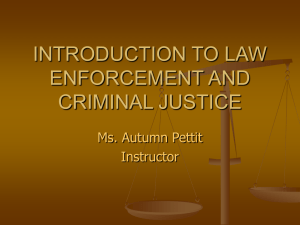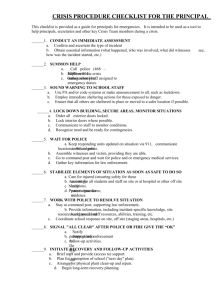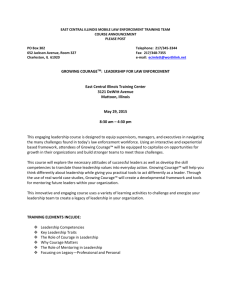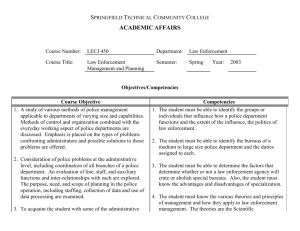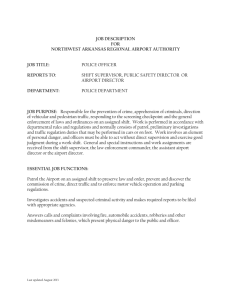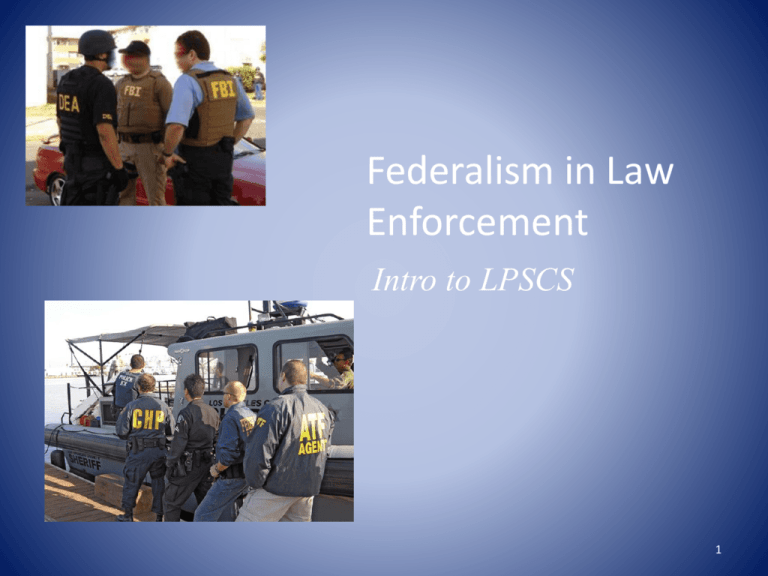
Federalism in Law
Enforcement
Intro to LPSCS
1
Federal and State Law
Enforcement Agencies
Different Governments
Different Authority
Different Responsibilities
2
Federal Law Enforcement Agencies
•
•
•
•
•
•
•
•
•
•
•
73 Federal Law Enforcement Agencies
120,000 officers/agents
Customs and Border Protection 36,863
Federal Bureau of Prisons 16,835
Federal Bureau of Investigation 12,760
U.S. Immigration and Customs Enforcement 12,446
U.S. Secret Service 5,213
Drug Enforcement Administration 4,308
U.S. Marshals Service 3,313
Internal Revenue Service, Criminal Investigation 2,636
Bureau of Alcohol, Tobacco, Firearms and Explosives 2,541
Copyright © Texas Education Agency 2011. All rights reserved.
Santa Teresa
School
Intro
topermission.
LPSCS
Images and High
other multimedia
content
used with
3
Federal Law Enforcement Agencies
• Primary functional areas
–
–
–
–
–
–
Criminal Investigation and Enforcement
Police Response and Patrol
Inspections
Corrections and Detention
Security and Protection
Court Operations
• Four largest agencies are in the Department of
Homeland Security (DHS) (2) the Department of
Justice (DOJ) (2) employ about two-thirds of all
federal officers.
Copyright © Texas Education Agency 2011. All rights reserved.
Santa Teresa
School
Intro
topermission.
LPSCS
Images and High
other multimedia
content
used with
4
Federal LEO
Roles and Responsibilities
• Protect U.S. borders at official ports of entry.
• Prevent illegal entry of people and contraband between the ports
of entry.
• Patrol the nation’s land and sea borders to stop terrorists and drug
smugglers.
• Conduct investigations involving national security threats,
terrorism, drug smuggling, child exploitation, human trafficking,
illegal arms export, financial crimes, and fraud.
• Investigation, identification, arrest, prosecution, detention, and
deportation of aliens, as well as the apprehension of absconders.
• Investigation and enforcement of counterfeiting, financial crimes,
computer fraud, and threats against dignitaries.
• Protect the White House complex and other Presidential offices,
the main Treasury building and annex, the President and Vice
President and their families, and foreign diplomatic missions.
Copyright © Texas Education Agency 2011. All rights reserved.
Santa Teresa
School
Intro
topermission.
LPSCS
Images and High
other multimedia
content
used with
5
Federal LEO
Roles and Responsibilities
• Conduct criminal investigations covering more than 200 federal
statutes related to the postal system.
• Enforce federal laws related to the illegal use and trafficking of
firearms, the illegal use and storage of explosives, acts of arson and
bombings, acts of terrorism, and the illegal diversion of alcohol and
tobacco products.
• Investigate major narcotics violators, enforce regulations governing
the manufacture and dispensing of controlled substances, and
perform other functions to prevent and control drug trafficking.
• Criminal investigation and enforcement related to more than 200
categories of federal law such as public corruption, civil rights
violations, organized crime, white-collar crime, violent crime, and
major theft.
Copyright © Texas Education Agency 2011. All rights reserved.
Santa Teresa
School
Intro
topermission.
LPSCS
Images and High
other multimedia
content
used with
6
State Law Enforcement Agencies
• 17,985 state and local law enforcement
agencies
• 12,501 local police departments
• 3,063 sheriffs’ offices
• 638 other agencies, primarily county
constable offices in Texas.
• 1.1 million law enforcement officers
Copyright © Texas Education Agency 2011. All rights reserved.
Santa Teresa
School
Intro
topermission.
LPSCS
Images and High
other multimedia
content
used with
7
Primary State Law Enforcement
Agencies
•
•
•
•
•
•
•
Each state has a primary law enforcement agency
California Highway Patrol (7,207)
New York State Police (4,847)
Pennsylvania State Police (4,458)
Texas Department of Public Safety (3,529)
New Jersey State Police (3,053)
New Mexico State Police (528)
Copyright © Texas Education Agency 2011. All rights reserved.
Santa Teresa
School
Intro
topermission.
LPSCS
Images and High
other multimedia
content
used with
8
State LEO
Roles and Responsibilities
•
•
•
•
Local Police includes municipal, county, tribal, and regional police that derive authority
from the local governing body that created it. The primary purpose is to uphold the
laws of the jurisdiction, provide patrol, and investigate local crimes.
Sheriffs – Generally sheriff’s offices are granted authority by the state to enforce state
law at the local county level. Deputies commonly run the local jail, serve warrants and
court summons, and respond to calls for service in areas outside local police
jurisdictions.
State Police / Highway Patrol – State police often perform police duties to include
highway patrol and statewide investigations. Some states have only highway patrol with
investigative functions covered by a separate entity such as a state bureau of
investigation. State police assist local police with investigations and emergencies that
extend beyond the resources and jurisdictional boundaries of the local agency.
Special Jurisdiction Police – Officers for special jurisdictions provide police services for
defined entities or areas within another jurisdiction. These include parks, schools,
transportation assets (e.g., airports, subways), hospitals, housing authorities, and
government buildings. Special jurisdiction police are generally full-service departments,
offering the same services as local police.
Copyright © Texas Education Agency 2011. All rights reserved.
Santa Teresa
School
Intro
topermission.
LPSCS
Images and High
other multimedia
content
used with
9
Separate but Equal Agencies
• What authority do FBI special agents have to make arrests in the United
States, its territories, or on foreign soil?
• In the U.S. and its territories, FBI special agents may make arrests for any
federal offense committed in their presence or when they have
reasonable grounds to believe that the person to be arrested has
committed, or is committing, a felony violation of U.S. laws.
• If a crime is committed that is a violation of local, state, and federal laws,
does the FBI “take over” the investigation?
• No. State and local law enforcement agencies are not subordinate to the
FBI, and the FBI does not supervise or take over their investigations.
Instead, the investigative resources of the FBI and state and local agencies
are often pooled in a common effort to investigate and solve the cases. In
fact, many task forces composed of FBI agents and state and local officers
have been formed to locate fugitives and to address serious threats like
terrorism and street violence.
Copyright © Texas Education Agency 2011. All rights reserved.
Santa Teresa
School
Intro
topermission.
LPSCS
Images and High
other multimedia
content
used with
10


